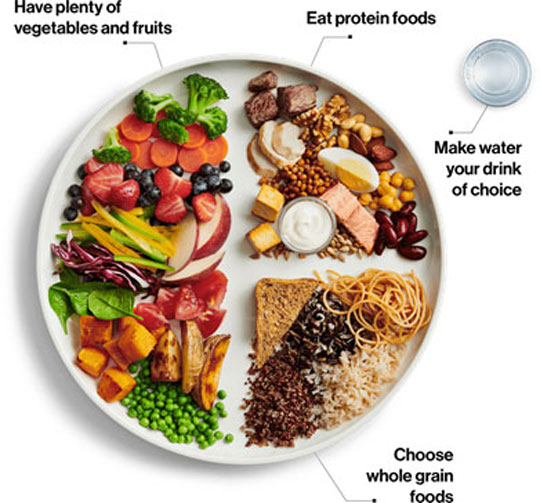Strengthening the Forces: Nutrition Facts for Pregnancy & Lactation
May 5, 2022 - Defence Stories

Caption
Have plenty of vegetables and fruits, Eat protein foods, Make water your drink of choice, Choose whole grain foods
Meals
- Try making hearty meals that include carbohydrates, protein & fats
- Pasta dishes, casseroles, soups and stir-frys
- Add whole or pureed beans or lentils to soups, stews and sauces to increase calories, protein, and fibre
- Add an extra vegetable side dish to your meal like broccoli, Brussels sprouts or spinach for added calcium
Snack Ideas
- Trail mix, nuts and seeds
- Homemade muffins or banana bread
- Sandwich with vegetables and a protein on whole grain bread
- Hummus with vegetables and pita
- Smoothie made with your favourite fruit and low-fat yogurt
- Chia seed pudding
- Have fruit and vegetables already prepared in the fridge to grab easily
Healthy Weight Gain
- Canada's Food Guide (you are now leaving the Government of Canada website) can assist you with eating healthy while pregnant and breastfeeding
- Healthy weight gain helps the baby develop and grow
- Most weight gain occurs in the second and third trimesters
- Expect to gain about 1lb per week after the first trimester
- Eat a little extra food while pregnant and breastfeeding
- Add the extra calories by eating a healthy snack or two during the day or by adding some extra food to your meals
Caffeine
- It is recommended that you do not exceed 300mg of caffeine a day
- Caffeine levels found in common items:
- 1 cup of drip coffee has about 130mg (varies based on brewing method)
- Tea 30-50mg
- 1 can of dark soda 30-50mg
- 1 oz (28g) of chocolate 7-19mg
Alcohol
- The safest choice is to not drink alcohol while pregnant. It can lead to developmental complications (like Fetal Alcohol Syndrome and birth defects) There is no safe amount of alcohol during pregnancy
Supplements
- Those who are pregnant or wanting to become pregnant should take a daily multivitamin that contains 0.4 mg of folic acid
- Folic acid reduces the risk of neural tube defects
- Iron needs increase to about 27mg/day.
- Check to make sure your prenatal vitamin contains iron
- Calcium needs increase:
- Good calcium sources: milk, soy beverage, cheeses, yogurt, tofu, white/navy beans, spinach and dark green vegetables
Food Safety
- Pregnancy can make you more susceptible to illness
- Wash your hands regularly
- Wash all produce
- Avoid cross-contamination by using separate cutting boards and utensils for different food groups
- Only eat pasteurized dairy products but avoid soft cheeses like Brie, Havarti, blue cheese and soft goat cheese
- Ensure food is cooked to the recommended internal temperature:
- Beef 71°C (160°F)
- Poultry 74°C (165°F)
- Pork 71°C (160°F)
- Fish 74°C (165°F)
- Eggs 74°C (165°F)
- Avoid raw fish, smoked seafood, deli meats, pâté and meat spreads
Please consult with your health care provider or obstetrician if you change your diet or have questions regarding nutrition during and after your pregnancy.
Resources
- Your Guide to a Healthy Pregnancy by Health Canada – information on pregnancy including nutrition, mental health and preparing for birth
- Canada’s Food Guide to easy and healthy recipes
- Pregnancy Weight Gain Calculator and Guide – always check with your health care provider if the results are right for you. This is a guide and does not replace individualized medical advice.
- Pre-natal and lactation nutrition from Dietitians of Canada
- Food safety for pregnant women